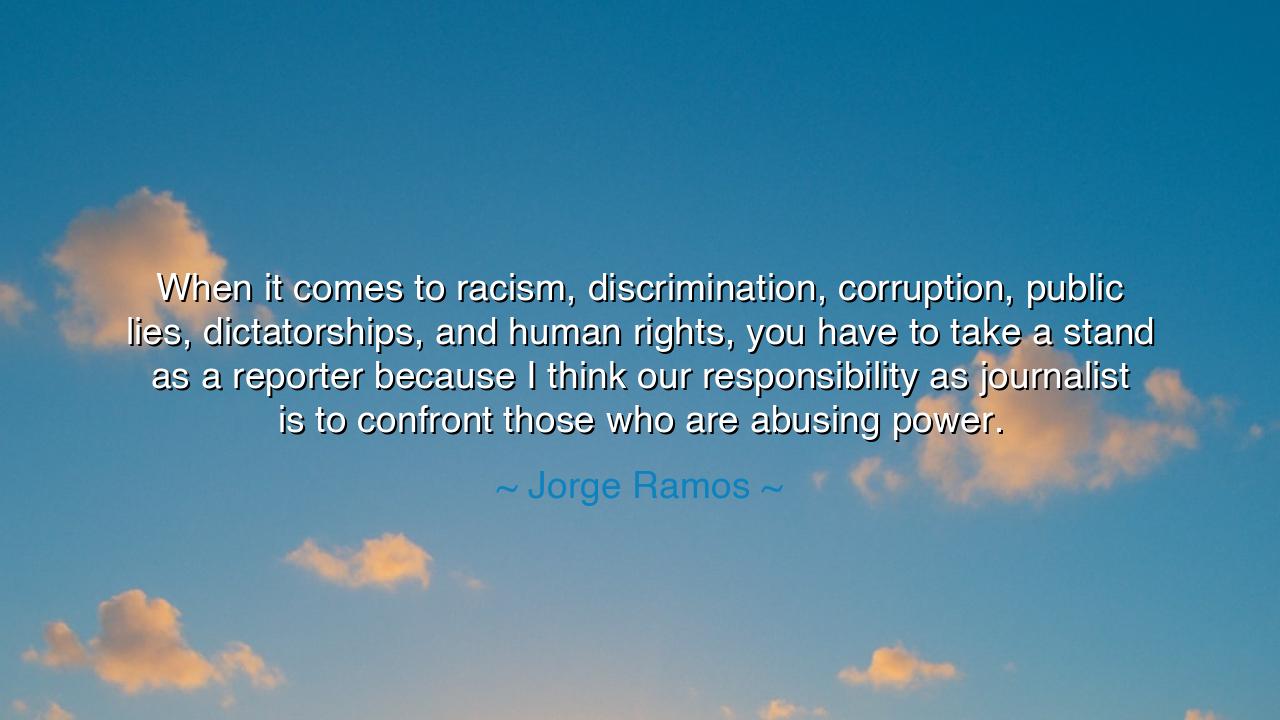
When it comes to racism, discrimination, corruption, public
When it comes to racism, discrimination, corruption, public lies, dictatorships, and human rights, you have to take a stand as a reporter because I think our responsibility as journalist is to confront those who are abusing power.






“When it comes to racism, discrimination, corruption, public lies, dictatorships, and human rights, you have to take a stand as a reporter because I think our responsibility as journalists is to confront those who are abusing power.” These words of Jorge Ramos are the call to arms of our age, a summons to all who carry the pen and the microphone, urging them to wield their craft as a weapon of truth. The reporter, like the ancient warrior, is entrusted with a sacred duty: to confront the forces of darkness — whether they are the silent whispers of racism, the open wounds of discrimination, or the glaring injustices wrought by those who hold power. It is not enough to observe; the reporter must engage, for in silence, oppression flourishes.
The ancient world was filled with rulers who sought to control the minds and hearts of the people through fear, lies, and brutality. Yet, there were those who stood against them, their voices like the clarion call of freedom. The Greek playwrights, such as Sophocles and Euripides, used their art to challenge the tyranny of the gods and the rulers alike, shining light upon the corruption that lurked beneath the surface of power. It is through such confrontation that the shadows of dictatorships are driven back, and the light of truth illuminates the path toward justice.
In the dark days of the Roman Empire, Cicero, a senator and philosopher, took a stand against the corrupt leaders who sought to undermine the republic. With his words, he exposed the greed and moral decay that had taken root in the hearts of those who wielded power. His speeches against the conspirators in the Senate were the lifeblood of the Roman resistance, a testament to the power of journalism, even in its infancy. Just as Cicero took up the mantle to speak for justice, so too must modern journalists take up the pen and speak for the voiceless, for it is in this act of confrontation that they fulfill their sacred duty.
The great leaders of history, from Gandhi to Mandela, also understood the importance of standing against injustice and oppression. Their struggles were not born of personal ambition, but of a profound sense of responsibility to their people. They knew that human rights are not a gift bestowed by those in power, but a birthright that must be defended against those who seek to strip it away. It is this same sense of duty that the journalist must carry — to challenge the dictatorships, the lies, and the corruption that seek to erode the very fabric of freedom.
In our time, those who abuse power continue to operate under the veil of deception and manipulation. But the journalist, with their keen eye for truth and their courage to stand firm, can pierce that veil. When racism and discrimination rear their ugly heads, when the truth is twisted into lies, it is the responsibility of the journalist to confront these forces, to speak truth to power, and to hold the oppressors accountable. In doing so, they ensure that the light of justice shines even in the darkest corners.
Thus, let the words of Jorge Ramos serve as a guiding beacon for those who seek the truth. May the reporter stand as a sentinel against injustice, a warrior armed not with swords or shields, but with the unwavering resolve to expose the corruption of power. For it is through this confrontation that the soul of a nation is preserved, and its people are set free.






TDThach Do
I admire this conviction, but I also wonder where the ethical line lies. Should every journalist take a stand on moral issues, or only when evidence is clear and undeniable? What happens when 'taking a stand' blurs into personal opinion or advocacy? This makes me think about the evolving role of journalism — not just as an observer of events, but as a participant in shaping public conscience.
PLNguyen Phan Phuc Loi
This quote makes me think about the courage it takes to confront authority. Journalists who expose corruption or discrimination often face threats or censorship. Do we, as readers, fully appreciate the risks they take to defend truth and justice? I’d like to know how society can better protect and support reporters who refuse to stay silent, especially in countries where free speech is under attack.
DNdiep nguyen
I completely agree with this point — journalists must hold those in power accountable. But in today’s polarized media landscape, I’m concerned that taking a stand often leads to accusations of partisanship. How can reporters maintain integrity and trust while challenging systemic wrongs? It feels like a difficult balance between truth-telling and being labeled as politically motivated. Is neutrality even possible anymore in such contexts?
TTNguyen Thi Toan
This statement resonates with me because it highlights journalism’s moral duty beyond neutrality. Still, I wonder — how do reporters balance objectivity with activism when confronting issues like racism or corruption? Is taking a stand inherently biased, or is silence the greater form of bias? I’d like to hear perspectives on whether journalism can remain credible while also being passionately committed to justice and truth.